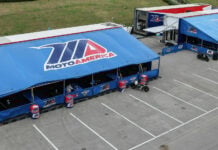Racer Arthur Wagner was awarded $1.5 million in damages plus legal fees when he won a lawsuit in the U.S. District Court for the District of Kansas against SFX Motor Sports, Inc. (SFX), a division of Clear Channel Communications, which owned Formula USA (F-USA) and Championship Cup Series (CCS) at the time of the incident. The lawsuit, which started in 2005 and concluded in November of 2007, stemmed from a crash by Wagner during the F-USA Team Challenge race at Heartland Park Topeka August 8, 2003. Wagner lowsided in what has been identified as Turn 10, slid through the grass run-off area and impacted a concrete wall of the type commonly referred to as a “jersey barrier.” Wagner suffered injuries caused by his collision with the wall and by a fire (ignited by his motorcycle), which spread to the grass around it and burned Wagner. Wagner contended that SFX and Heartland Park Topeka failed to provide proper protection to participants, specifically that the defendants failed to provide adequate run-off room for foreseeable crashes; left unnecessary moveable concrete walls in the foreseeable run-off area; did not pad the concrete walls with haybales, tires or soft barriers; did not properly train cornerworkers, who were therefore unable to put out the fire effectively; did not adequately staff the corner in question so that a crashed rider could receive help quickly. The suit also contended that the communications system between cornerworkers and race control was inadequate, resulting in the race not being stopped in a timely manner after the accident, this delaying aid to Wagner. After a five-day trial in July of 2007, a jury found “wanton conduct” on the part of SFX but not on the part of co-defendant Heartland Park Topeka. In its ruling, filed November 27, 2007, the court said that Wagner had presented enough evidence to support the claims that the barrier he hit was indeed moveable and had not been moved, that used tires were available for padding and had not been used and that the staffing of Turn 10 was not adequate. The ruling, however, also included the statement: “¦had this case been tried to the court sitting without a jury, there would not have been any finding of wanton conduct on the part of SFX. That is, the trial judge found the testimony of [Kenneth] Abbott, [Kevin] Elliott, [Gordon] Spieckerman, [Bill] Ritger, and [Bill] Fehrman to be exceptionally credible and almost entirely favorable to SFX, in that all of these gentlemen are very experienced in motorcycle race operations and safety, and all seemed quite sincere in their efforts to stage the race as safely as possible, mindful that racing presents many inherent dangers. The court perceived the testimony of plaintiff’s retained expert witness (Russell Darnell) to be pretty much of the ‘hired gun’ variety, in that he claimed to be an expert not only on motorcycle racing but on a nearly endless number of topics. But of course this was not a bench trial. As earlier indicated, a trial judge does not have veto power over a jury which draws its own reasonable inferences from the trial record as a whole. Although SFX implicitly ignores this major point, the jury in this case was within its rights to believe little, or indeed, none of the sworn testimony of SFX’s employees. The jury was within its prerogative to deem Darnell credible, even if the trial judge perceived him to be quite the opposite.” Wagner’s original award for damages was approximately $2.6 million, but a post-trial motion filed by SFX resulted in Wagner’s “non-economic” damages being reduced from $1,286,156.53 to $250,000 based on a Kansas law putting a “cap” on such damages. In pre-trial proceedings, U.S. District Judge Hon. Kathryn H. Vratil ruled against Wagner’s allegations of negligence against SFX, Heartland Park and the track’s operators Jayhawk Racing Properties based on the fact that Wagner signed a liability release waiver prior to the race. Judge Vratil also granted summary judgment against Wagner’s claims of liability against Jayhawk Racing Properties, SFX and Clear Channel Communications, “finding there was no basis for liability of any of these defendants.”
Injured Club Racer Wins $1.5 Million Plus Legal Fees In Lawsuit Against Race Promoter Stemming From 2003 Crash At Heartland Park
Injured Club Racer Wins $1.5 Million Plus Legal Fees In Lawsuit Against Race Promoter Stemming From 2003 Crash At Heartland Park
© 2008, Roadracing World Publishing, Inc. From a press release issued By David Swarts.






